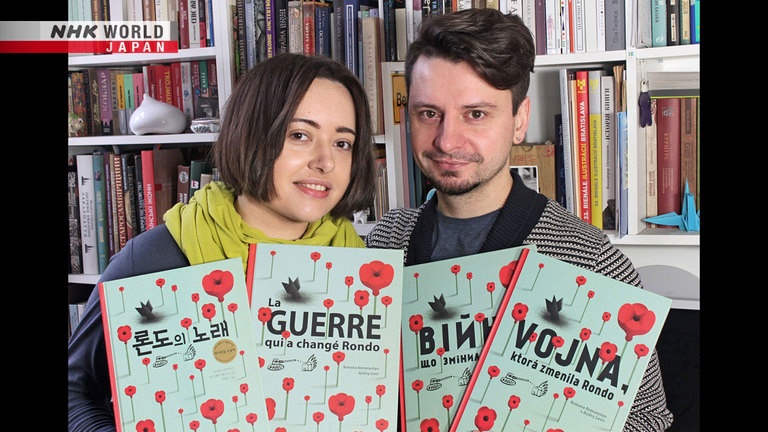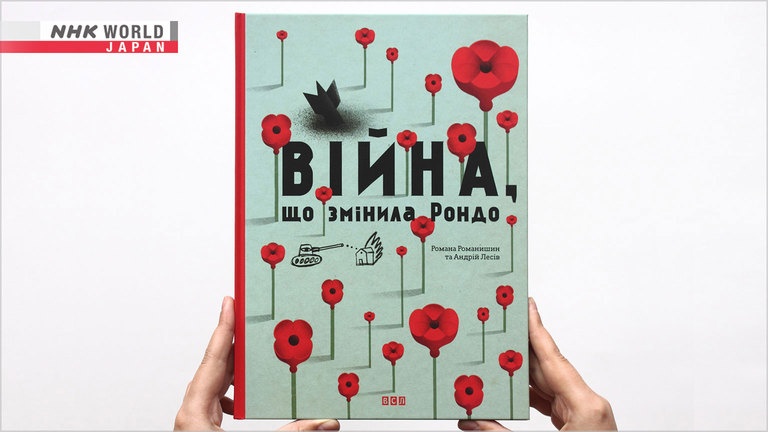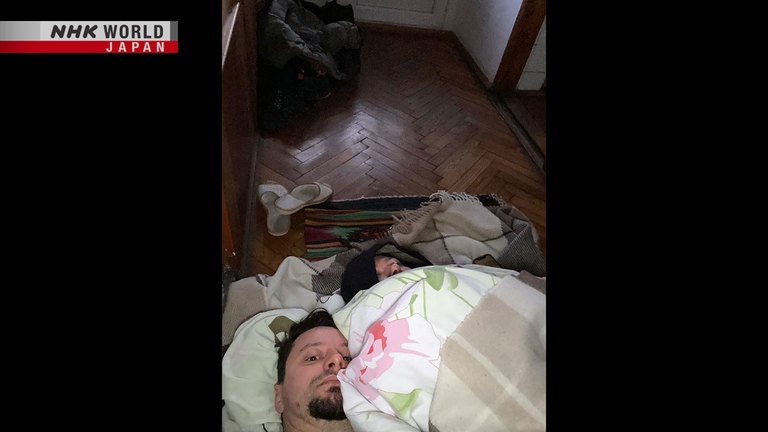Illustrating War for Children: Romana Romanyshyn / Picture Book Creator, Art Studio Agrafka
Ukrainian picture book creator Romana Romanyshyn co-founded the art studio "Agrafka." Despite the 2022 Russian invasion, she remains in her homeland to communicate the truth of war through her works.

Romanyshyn set up art studio "Agrafka" in 2009 with Andriy Lesiv, her creative partner since university.

Their picture book, "How War Changed Rondo," which was influenced by Russia's 2014 annexation of Crimea and the war that followed, was highly acclaimed inside and outside Ukraine. First published in 2015, it is receiving renewed attention since the 2022 invasion.

Since the February 2022 Russian invasion of Ukraine, air raid sirens have become a familiar sound.
Transcript
Direct Talk
On February 24, 2022,
Russia launched its invasion of Ukraine.
Suddenly, the people of Ukraine
were thrust into a nightmare of violence.
A nightmare that continues, six months on.
Ukrainian-born picture book creator
Romana Romanyshyn
remains in her home country,
searching for ways in which
she can use her artistic skills
to help the situation in Ukraine.
The lives of Ukrainian children
changed dramatically.
We see that picture books
are in great demand now.
One picture book in particular
caught the public's attention
following Russia's annexation
of Crimea in 2014.
It's her 2015-work,
"How War Changed Rondo."
The imaginary town of Rondo was peaceful
until one day
a monster called "War" came to swallow it up.
Eight years later,
Romanyshyn is once again
confronted by another war
as she creates a new picture book.
The central theme is: the importance of
communicating with other living beings –
humans, animals, and plants alike.
How can we explain
the current war to our children?
We search for an answer
in Romanyshyn's works.
Illustrating War for Children
We have to talk to children really honestly
that we have to stand for what we love,
that we have to protect our freedom,
and that we have to protect this very fragile
structure and architecture of our world,
of our social networking, of our contacts,
because they are really fragile things
which we have to protect.
"How War Changed Rondo," published in 2015,
illustrates the truth about war
in a way children can understand.
The hero is a sprite called "Danko"
who shines like a light bulb
and lives in Rondo, an imaginary town.
Danko lives a happy life,
chatting and singing songs with his friends,
a balloon dog named "Fabian"
and "Zirka," a paper airplane.
But one day,
something suddenly appears
and destroys this idyllic life.
That something is "War."
This book was our artistic response to
the events which happened in our country.
It was eight years ago,
right after Russia annexed Crimea
and invaded the east of Ukraine
and the war started.
And our life changed drastically
because we were very shocked
by what was happening.
Many adults and many children died
after bombing
and after aggressive military actions,
many became refugees,
so we wanted to react in some way,
it was a really
emotional reaction and project.
Back then,
the parents had a problem (with) how to talk
to their children about what was happening,
about our new reality,
about war which is still real and present.
There was no book,
children's book, about the war
and about the experience of
how you survive the war.
So it was our main goal
to create this platform,
a starting point
for this really hard discussion and hard talk
between adults and children
about what is going on.
Because we all know that
you cannot hide anything from children
because they sense everything really well.
In "How War Changed Rondo,"
the brave little sprite Danko
tries to talk to "War."
But "War" won't listen
and attacks him instead.
Danko's heart is hurt.
"War" is ruthless and emotionless,
like a lifeless artificial being.
Danko and his friends use
all their cleverness to fight "War."
And eventually,
they win.
Light returns to Rondo.
The book concludes with the following words.
"Their neighbors also bear scars.
Each has sorrowful memories of War,
and how it changed Rondo forever."
This book does not have a happy ending,
because of course it's fictional
but it's based on reality.
So we are talking about changes.
How war changes our life,
how war changes us physically and mentally,
how it changes our bodies and souls
because our bodies and souls
are now covered in scars.
Of course it will be not so hard
to rebuild our destroyed cities,
to renew our houses,
but we will never meet
the people that we lost
and we have to remember all the events
that happened in our country.
The picture book has gained much attention
and has now been translated into 16 languages,
touching the hearts of parents
and children around the world.
What is the most important for us
(is) that we got really nice reactions
and we got many letters and
drawings from many children
also from attacked cities on the frontline.
So it's really important for us
to get this contact with children,
who are our young readers.
I can even show you
one of the collections from children.
It's like that, so you can see here...
It's like a city before the war,
it's flourishing
and the city after the war
you see it goes black and white.
So mostly the children were commenting (on)
what is going on in real life,
and that they liked
these characters very much
and that they hate war
and that they are
hoping for a peaceful future.
So it's really important for us to be
in such close contact with our readers.
Romanyshyn was born in the
Ukrainian city of Lviv in 1984,
to a family of artists.
She grew up surrounded by
her father's paintings and sculptures.
In 2009 she set up an art studio
called "Agrafka"
together with her partner Andriy Lesiv,
whom she met at art school.
Romanyshyn is in charge of the
drawings and other artistic creations,
and Lesiv, the layout and design.
You know in our duo, Romana is
more emotional and I am more rational,
so I think the balance is
just right for a great cooperation.
After Russia's annexation of Crimea,
conflict continued mainly in eastern Ukraine.
Following the publication of
"How War Changed Rondo"in 2015,
the topic of war continued to influence
Romanyshyn's creative work.
Then in 2022, Russia invaded Ukraine.
Almost every day we hear air raid sirens
and we have to hide in the shelter.
Russia wants to eliminate our nation,
our language,
our culture,
our identity,
and they do not intend to
hide their intentions anymore.
We have to protect our freedom.
This is our main goal.
We have to protect
all the fragile things that we have,
our freedom, our culture,
our language, our territory.
The main thing that
we want to achieve is also the justice
and the punishment for all the war crimes
that Russians are committing.
But as a picture book creator,
how will Romanyshyn
illustrate the ongoing war?
It's a challenge she is only
just beginning to address.
As artists,
we have a lot of work to do
to re-think all the events
and to work with
all different angles of this war.
So we have a lot of projects
to do in the future.
We take part in
different projects for fundraising,
for example, to gather funds for the army,
or for refugees, or for hospitals.
So it's really a lot of work to do.
Donated artwork
"Missing Home"
Romanyshyn has been creating
and donating various artwork
for fundraising to help Ukraine.
Currently, she is also working on
a new picture book
that she had started creating
before the war broke out.
She had planned on making "communication"
the theme of her new book.
And now with the outbreak of the war,
she has become acutely
aware of the importance of
"building close relationships with others."
It was not related to the war actions,
but even though (so)
the war affects even this book,
which will include some angles,
some visions of war.
I hope in the future we will create
some new important projects related to war.
But we feel that
we have to take some distance
and some time to understand
the whole scale of changes
that this war will bring to
our lives and to the world.
Romanyshyn believes that now more than ever,
children need paper picture books,
not digital ones,
to help them through these difficult times.
There is a big demand for
picture books now in Ukraine
because these picture books are like
the bridge to the previous peaceful life,
to the "normal" life of those children.
They like to read and
they like to see the pictures,
and our book got a new edition
because the children need the paper version,
not the electronic one,
but the paper version.
Because during the war,
we are all very sensitive.
We need to hug,
we need to touch.
And the book is a really magical object
because you can fold it,
you can see it, touch it,
that tactile contact is very important.
With the paper,
you can hear the sound of folding pages.
So it is really important to
come into contact with the real book.
We are not alone in what we do,
we have to help other people
and we have to understand
that many people also need our help.
We have to be really active to
achieve the goals which we like.
I think that picture books have the strength
in some way to program these things.
Because children,
they really interact with picture books,
and picture books are like
the first art gallery which they visit,
and they read picture books
from a very young age.
So I think it is a very powerful media
to talk to children
and to develop really strong people.
"Protect Freedom! Glory to Ukraine!"
I think freedom is the most important
for developing for our world.
I think it's the basic (principle)
that we have to protect
and that we have to fight for.
Protect Freedom! Glory to Ukraine!